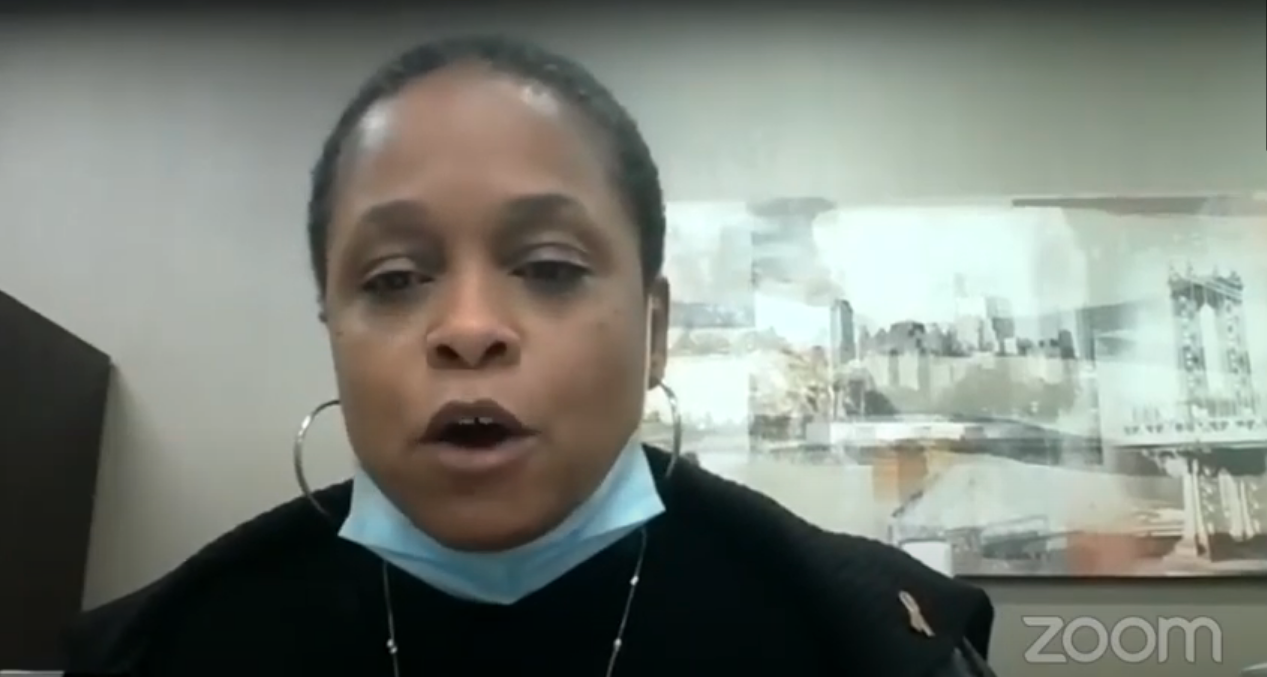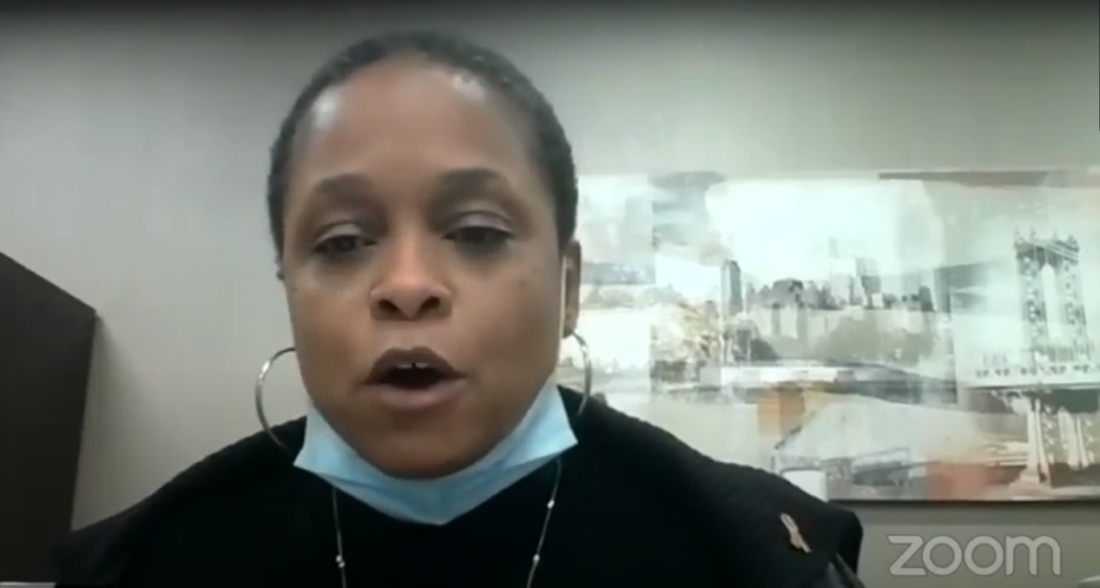After Another Meeting Implodes, the Fight for the Brooklyn Democratic Party Will Head Back to Court


The Brooklyn Democratic Party County Committee’s virtual meeting yesterday imploded after a party-hired parliamentarian voided a recently-approved slate of reforms, resulting in hundreds of party members signing off in protest.
The nearly twelve-hour meeting was a continuation of an earlier thirteen-hour gathering, both of which were filled with technical problems, allegations of vote stealing, angry debates over meeting rules and accusations of violent threats.
The fight was yet another salvo in what has become a public war between reformers, who say the party is insufficiently transparent, democratic and accountable, and a party leadership that has resisted changes with increasingly heavy-handed tactics.
“What happened yesterday was that an autocrat lost an election, and then came back a week later looking for ways to overturn the results,” District Leader Doug Schneider told Bklyner, referring to the party’s chair, Assembly Member Rodneyse Bichotte. “Ultimately, it was like a more competent version of Donald Trump.”
When asked if the meeting would result in legal action against party leadership, Ali Najmi, an attorney who has represented party reformers in multiple lawsuits against the party this year, said simply: “Hell yeah.”
How did we get here?
First, some context.
County Committee is the Brooklyn Democratic Party’s rank-and-file membership body, which votes on the party rules, leadership and finances, as well as judicial candidates. Each County Committee seat represents an area of only a few city blocks, and the role is often an early stepping stone for residents looking to get more involved in local politics.
But for years, the County Committee has been largely sidelined by party leaders, which used a complicated vote proxy system to control decision-making, drawing accusations of corruption and machine politics. A group of reform-minded political clubs, most notably New Kings Democrats (NKD), has lately looked to change that dynamic by electing like-minded District Leaders to the party’s 42-member Executive Committee, and to the County Committee with a program called Rep Your Block.
This October, the party tried to cancel its legally-required County Committee meeting for the year, citing coronavirus concerns. They argued a virtual meeting would disenfranchise members without access to technology, though county parties in Queens and the Bronx had successfully hosted similar meetings online.
After a group County Committee members aligned with NKD sued, Brooklyn Supreme Court Judge Edgar Walker overruled the party’s decision, calling it “a ruse for the leadership of the Executive Committee to retain their authority.”
Then, in November, a task force charged with overhauling the party’s use of gendered committee assignments slipped into its proposal what many reformers considered a poison pill: they enabled the party’s Executive Committee to fill thousands of empty County Committee seats by appointment, taking the power away from the County Committee itself.
The move infuriated many, including several members of the task force itself.
“All of [Party Chair Rodneyse Bichotte]’s LGBTQ support is wrapped up in power grabs,” said one member, Jared Arader, president of the political club Lambda Independent Democrats. “It’s so insulting and offensive, and just not listening to what the community wants.”
NKD sued again, and Judge Walker ruled in their favor, overturning the appointments.
What happened this month?
The full County Committee meeting finally took place last week and, after a grueling fight over virtual voting and procedural rules, attendees voted to approve a slate of rules that created new oversight over the party’s troubled finances, added a second yearly County Committee meeting, established clearer meeting procedures and reformed the byzantine proxy voting system.
Reformers called the vote “historic” and said the new rules would make the party more transparent and accountable. But their celebration did not last long.
On Monday, the Executive Committee voted to replace County Committee Chair Carlo Scissura, who resigned from the largely symbolic position after the meeting, with outgoing Bedford-Stuyvesant Assemblywoman Tremaine Wright, in a process some reformers called “illegal” and illegitimate. The party also held a “meet and greet” event with candidates for officer positions that did not include members of an alternative slate proposed by reformers.
Then, yesterday, the County Committee gathered again to formally seat its new members, elect officers and consider some additional rules changes. But even before the meeting began, some began to suspect foul play.
“At the end of the last meeting, [NKD President Mariana Alexander]’s motion included a clear order of events that were going to happen in this second meeting,” said NKD Communications Director Caitlin Kawaguchi. “County sent out the agenda the night before this meeting, and we saw it didn’t align with our motion. And that was the first red flag.”
Kawaguchi said NKD requested more information about the agenda and voting processes but received no response from the party.
Yesterday’s meeting began with a four-hour fight over whether to formally adopt Robert’s Rules of Order, a process again delayed by issues with the voting technology. Several County Committee members attempted to object to the vote and argued the rules were being implemented with ulterior motives, but Wright muted most of them, calling their complaints “out of order.”
When the motion eventually passed, Rob Robinson — a registered parliamentarian the party hired to manage the meeting – declared the NKD reforms were void because they violated the rules of Judge Walker’s court decision as well party rules that say resolutions requiring a vote could no be held during the “new business” and “unfinished business” sections of the meeting.
“The omnibus motion at your last meeting was out of order,” Walker said.
But a County Committee member who is also a registered parliamentarian said Robinson should not have had the power to make such a declaration in the first place.
“The party misconstrued his credentials along with his title, as someone who could make legal rulings as to what occurred at last week’s meeting,” said Diana Duncan. “Parliamentarians are hired as consultants, they can be hired to serve as an impartial observer. But he was hired as a parliamentarian to help interpret rules of parliamentary procedure. And last night I just feel like the rules were misconstrued, and they weren’t even carried out in order, because there was no opportunity for attendees to even make a point of order without being cut off.”
Robinson also accused County Committee members of sending him threatening messages, including an email to his personal account. “I forwarded that to the police,” he told meeting attendees. Party leadership did not respond to a request for more information about those accusations, or confirm whether a police report had been filed. A law enforcement source was also unable to find a police report documenting the incident.
Early on, Robinson insisted he was a neutral actor, stating “I am not in the New Kings, I am not in County, I am not in any of these political organizations, I don’t have a dog in the fight.”
But reformers said the parliamentarian’s ruling was preordained by party leadership to undo reforms and retain power.
“This is outrageous & clearly would NOT stand in any court,” District Leader Samy Nemir-Olivares wrote on Twitter. “This is one of the most obstructive and undemocratic processes ever, eliminating votes not to their favor.”
Eventually, the County Committee voted to seat the new members. They also voted again on NKD’s proposals as well as an additional slate of rules changes proposed by party lawyer Aaron Maslow, but at that point, reformers had staged a virtual walk-out, calling the process illegitimate. On Twitter, several County Committee members began a coordinated Twitter campaign to draw attention to the walk-out.
I ran for County Committee to help organize local democrats in my community and to help elevate issues of climate and environmentalism, but Party leadership made that impossible by blocking a fair County Committee meeting. After 20 hours, I’m walking out. #CCMeeting2020.
— Steve Fox (@smfox) December 24, 2020
I'M OUT. 2018, SHAM. 2020, SHAM. This has been my life for so many years. I've been lied to so much that the people in power want to listen. They don't. They broke the law then, they break the law now. After 20 hours, I'm walking out. #CCMeeting2020 Bye y'all.
— Brandon West (@btwest) December 24, 2020
I ran for CC not to take control of what county does do but to try to make it do stuff it doesn’t think is its job. Engaging, educating, and listening to democrats. RYB should be an unnecessary endeavor if the party ran well. After 20 hours, I’m walking out. #CCMeeting2020.
— courtney adrian (@courtney_adrian) December 24, 2020
Apparently in response, District Leaders aligned with Bichotte organized their own Twitter campaign, sometimes using nearly identical language expressing support for the party.
Despite a global pandemic, @bkdems is holding its FIRST EVER virtual County Committee meeting. Thank you for upholding democracy during these difficult, trying times. #CCMeeting2020
— Lori Maslow (@IAMLORISUE) December 24, 2020
Despite a global pandemic, @BKdems is holding their FIRST EVER virtual county committee meeting. Thank you for upholding democracy even during these difficult times. #CCMeeting2020
— David Schwartz (@DavidSchwartz48) December 24, 2020
Another party-aligned District Leader, Arleny Alverado-McCalla, accused those who left the meeting of hypocrisy.
“The embarrassing part about this process is that those that said they wanted transparency and inclusion are the same one’s trampling over the process they requested,” she tweeted.
The meeting ended late on Wednesday night with the party’s officer slate elected over that of the reformers, most of NKD’s reforms overturned, and Maslow’s rule changes instituted. The rule changes require the party to host one policy-issue meeting every other year, and changed some minor rules regarding officer positions and subcommittees for individual districts.
The party also chose to implement NKD’s finance governance reform. But that was not enough to erase the distrust, anger and confusion many County Committee members and District Leaders said they felt.
“Yesterday’s #CCMeeting2020 was a total sham,” tweeted District Leader Kristina Naplatarski. She said the party “demonstrated that they’ll stop at nothing to stifle any dissent or disagreement, going so far as to use proxies & manipulation of parliamentary procedure to unravel reforms.”
So, what now?
After the meeting, party leadership issued a celebratory press release. The party Twitter account quoted Wright as saying, “That’s what transformation, change, growth and inclusion looks like. I am very proud of all of BK. We have been known to stand up. You have made sure that your voices are heard.”
Another District Leader, Edu Hermalyn, wrote simply “Moving forward together as United Democratic Party.”
Bichotte declined to comment for this article, but wrote on Twitter that “it was good to hear that fellow County Committee members wanting to support a public policy issue meeting,” and responded to criticism from one County Committee member by saying, “I’m very disappointed in your condescending tactics. There is no conspiracy. It’s time for continued work. Let’s move on. Happy holidays.”
But frustrated reformers seemed unlikely to accept the olive branch.
“Last night, we reached a new low – while leadership used words like Unity and transformation, what actually transpired was the opposite,” Julio Peña, an NKD-endorsed District Leader, told Bklyner.
“County Committee members and District Leaders were ignored and silenced under the guise of Robert’s Rules of Order and Parliamentary Procedure,” Peña said. “There was zero transparency in the voting process, while duly passed rules last week were thrown out, and votes were cast tonight with no idea who was voting and who was holding proxies. How can we trust this organization after last week?”
If, as Najmi said, reformers take legal action, it will be the fourth lawsuit filed against the party’s rules in the past year. While the lawsuit that led to the creation of the gender equity task force was thrown out on technical grounds, the party decisively lost the other two County Committee-related cases, both of which were argued by Najmi. Whether the party’s use of a parliamentarian in last night’s meeting will make a substantive difference in a future case remains to be seen.
Is the party doomed to fight forever?
The fight over the way the Brooklyn Democratic Party is managed has come increasingly into public view in recent months, as the number of progressive District Leaders has grown, and as the coronavirus pandemic forces meetings that were previously held in far-flung corners of the borough onto the internet.
“We have watched several power grabs to consolidate power,” said reform-oriented District Leader Shaquana Boykin. “COVID19 gave them an opportunity to go full steam.”
As long-simmering tensions have become visible, they’ve also seemingly calcified into a partisan battle between reform- and establishment-aligned District Leaders who have fought for power on a battlefield made up of complex procedure debates and confusing proxy rules. In one press release, Bichotte referred to reformers as “dissidents” looking to usurp the leadership’s power.
But there may be some nuances hidden beneath the surface.
“After these two 12+ hour meetings, I intend to be extremely engaged in seeing significant changes in our party’s structure,” District Leader Cory Provost told Bklyner. Provost has in the past been aligned with the party leadership, but said he had discussed “ushering in meaningful changes” with Bichotte.
“For me, it’s a mixed bag regarding Mariana’s rules,” he said. “I think we should evaluate the use of proxies and have more meetings overall.”
NKD itself looked to reframe the push for reform away from one of two competing sides; Kawaguchi, the club’s communications director, said she believed many District Leaders understood the need for better-run meetings and a more transparent party.
“I would say we don’t see this as a super stark divide or fight,” Kawaguchi said. “I think ultimately there are many District Leaders who want to see changes, who want to be able to appoint committed County Committee members who are engaged in their communities. There are district leaders that are more comfortable being outspoken right now, but I think there are District Leaders that are not as outspoken but are seeing what’s happening and know it’s wrong.”
Schneider also pushed back against framing the fight as one between “progressive” and “establishment” members of the Democratic party, and said the conflict was about transparency, not political ideology.
“In this reform coalition, there is a broad spectrum of political views,” Schneider said. “This is often framed as progressives vs anti-progressives, but we’re not at that point yet. This fight is all about getting to the point where we can hash out those policy distinctions.”
“But we’re not anywhere near that yet,” he said. “This is about getting to the point where that conversation can happen.”




